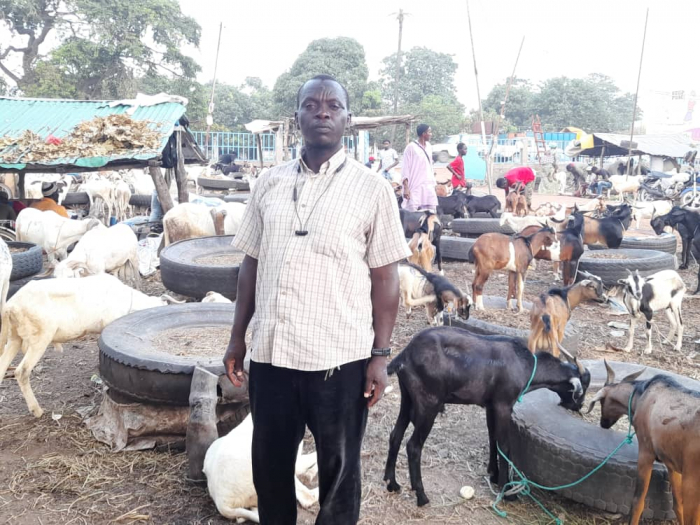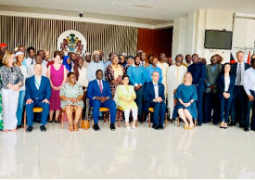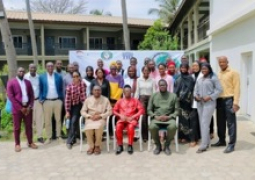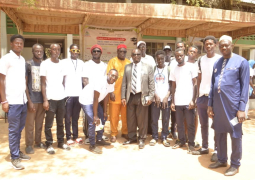
According to him, the pandemic severely affected the livestock sector business.
He added that livestock dealers could not do business without moving from one place to the other with Government placing restrictions on movement of people, goods and services.
He said the border closure for almost a year during the pandemic denied them the opportunity to travel to neighboring Senegal to purchase livestock from other dealers. “In business if you do not invest you cannot make profit,” he highlighted.
Mr Corta noted that it was really hard for most of them to sustain themselves during the period as they had to make very low profit.
According to him, some dealers had to sneak out of the country to buy animals but at very expensive prices as the foreign exchange rate was high due to the restrictions on movement.
He explained that Senegalese weekly market locally known as “lumo” used to open once in a while with some Gambian livestock dealers using the back way route to smuggle and sell their animals to sustain their families.
“No businessman can do without capital and 2020 was a year to forget for us,” he added, saying most of them had to take loans not to avoid their businesses collapsing but to feed their families.
He appealed to Government to recognise ‘Darals’ like other countries, saying livestock dealers also contribute to national development.
Momodou Alpha Jallow, a livestock dealer at the Brikama ‘daral’ (abattoir) said just as he started the livestock business, the pandemic hit. As such he said he found it difficult to keep up.
He stated that most of the time he would sit at the Daral the whole day without any sales during the pandemic and at some point had to stay at home.
Mr Jallow said he was jobless at some point because the livestock business was his only means of employment and survival.
Buba Darboe, another livestock dealer said most of their businesses failed due to the impact of the Coved-19 pandemic.
Mr Darboe said he spent all his savings to purchase animals but was not making any sales during the pandemic and as such it was difficult for him to sustain his family.
Abdourahman Kah, also said since the confirmation of the Covid-19 in the country, the price of livestock keeps increasing, adding that the cost to bring livestock into the country keeps getting higher.
He urged Government to reduce charges levied on them in importing livestock as well as other taxes.
Kaddijatou Bah, a livestock dealer said Covid-19 seriously affected her business, saying that during the Covid-19 period she found it hard to buy feed for her animals because her business collapsed and she had no money to feed them properly.
"I lost most of my livestock during the Covid-19 period due to lack of market and proper feeding. No one was willing to buy livestock. I will sometimes stay from morning to evening without sale which made it difficult for me to sustain my business. I took a loan to sustain my business because of the love I have for the livestock sector,” she added.
According to statistics by GLAMA, as of December 2020, 220 sheep were marketed while 174 goats were marketed by livestock dealers.
Covid-19 represents an unprecedented emergency and grave societal threat. The livestock sector is a key contributor to food and nutrition as well as the country’s GDP. A formal assessment is yet to be conducted but observations reveal disruptions in the livestock value chain.
Lesson from past pandemics indicate that these disruptions are likely to grow along with dire socio-economic consequences. Fortunately, actions can be taken to protect this sector and its activities, services and production.
The first case of Covid-19 was reported on December 31, 2020 and the source of the outbreak linked to a wet market in Wuhan (Hubei province, China).
The Gambia’s Ministry of Health confirmed the country’s first case of coronavirus on Tuesday March 17, 2020.
All flights in and out of The Gambia, apart from medical and air flight operations were suspended on March 23. The land border with Senegal was also closed except for essential supplies and security personnel.
As of 31st October 2021, The Gambia had officially registered 9, 965Coronavirus Cases, 340 deaths and 9, 611 recoveries.
This story was produced with support from Journalists for Human Rights (JHR), through its Mobilising Media in the Fight Against Covid-19 in partnership with Mai-Media and The Pointnewspaper.
Read Other Articles In National News

150,000 Children in Gambia benefits from WFD daily meals in 2024 Report
Nov 20, 2024, 10:34 AM
Bayo Fitness marks 2nd anniversary of Walk for Health
Mar 3, 2022, 1:55 PM



